I'll probably post a full Oscars index post tomorrow or Sunday. Anyway. Onward!
Drive My Car | Summer of Soul | West Side Story | Licorice Pizza | Nightmare Alley | The Hand of God | The Mitchells vs. the Machines | CODA | Attica | The Tragedy of Macbeth | Coming 2 America | Parallel Mothers | Lunana: A Yak in the Classroom | Four Good Days | Writing With Fire | Cyrano
, 20 March 2022, streamed via HBO Max
Uh, why didn't anyone tell me #DriveMyCar includes a scene from "Waiting for Godot" performed half in Tagalog? The actual theatre festival conceit is so cool: all the actors speak their own languages and don't necessarily understand each other, except through intonation and movement and, I suppose, memorization of the script. We hear Japanese, English, Korean, Mandarin, Tagalog, and once, German. AND ALSO: Korean sign language. It is amazing.
We start out with Kafuku and Oto--he's full theatre and she writes screenplays for TV. It turns out Oto's creative process is talking through a plot during sex, then having Kafuku tell her what she said while she was, y'know. busy. One day, though, Kafuku accidentally walks in on Oto having sex with a young actor from one of her shows. It turns out she strays quite a bit; he never says anything. Then one day she dies of a cerebral hemorrhage.
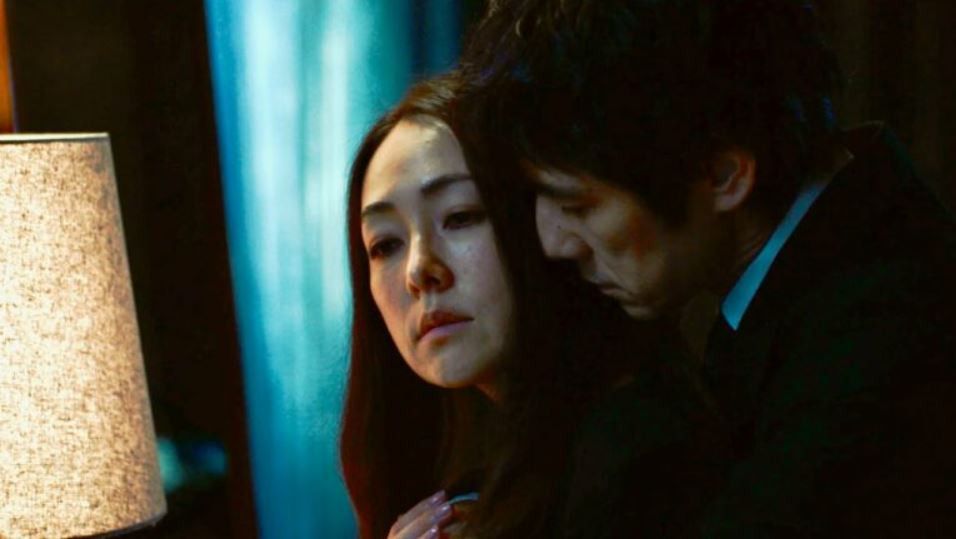
It's like an hour until we get the credits, by the way--after Oto dies. That's a really long cold open, geez. Anyway, later, Kafuku is the artist-in-residence at a theatre festival in Hiroshima. He's directing a production of Uncle Vanya, and remember that young actor that was having sex with Oto? Kafuku casts him as Uncle Vanya! It's really awkward but also weirdly harmonious.

I love all the rehearsals. It's mostly script readings that the actors fidget through, uncertain of what Kafuku's vision is. (Having directed before, I will say I am 100% of Kafuku's style and actors haaaaaate it.) It's quite lovely and the acting--when, again, most people don't speak the same language as the others--is gorgeous, even though I sometimes am like, "Stop turning your back to the audience! Your production is on a proscenium stage!"

For insurance purposes, Kafuku isn't allowed to drive his own car while being artist-in-residence. Instead, they hire a driver for him: Watari, a young woman who doesn't talk much but drives like a boss. They slowly get to know each other. Then that young actor beats up a dude who takes a picture of him (the young actor is something of a celebrity) and the dude dies. OH NO. And Kafuku has to step in. Freaked out, he asks Watari to take him on a road trip to the site of her old home, destroyed by a mudslide that also killed her mother.
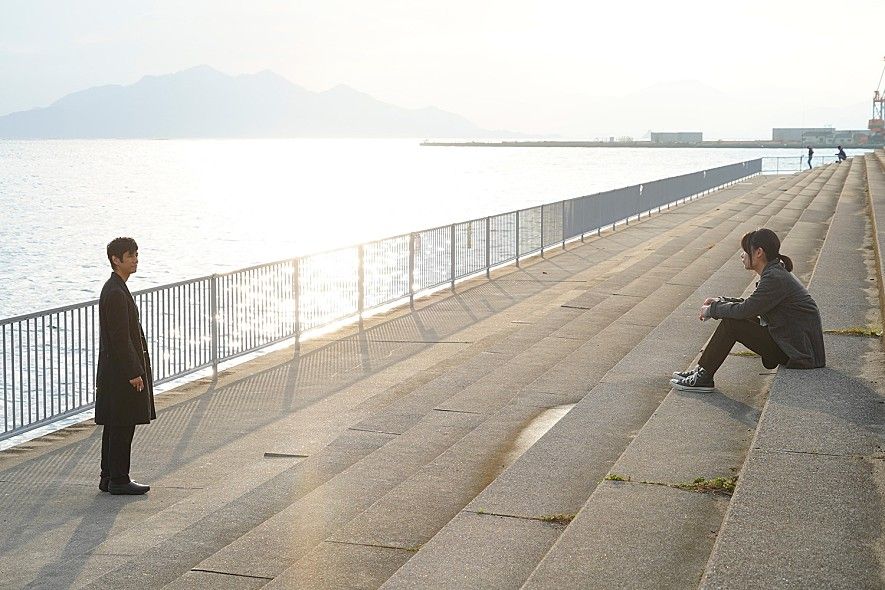
This is a slow, slow movie, but, ye gods, three hours is worth it.
Summer of Soul (...Or, When the Revolution Could Not Be Televised)
, 21 March 2022, streamed via HuluDid you know that, in the same summer of Woodstock, there was a Harlem Cultural Festival? There were a bunch of HUGE stars doing performances outside and then somehow nobody in the press picked up on it. Like, a dude filmed the entire series but nobody bought it. SERIOUSLY.

Questlove, bless 'im, brings us cuts from that film, as well as interviews of folks who were there. It's really great and why have we only ever had Woodstock as a cultural touchstone for 60s music festivals? Geez.
Man, I miss going to concerts.
, 21 March 2022, streamed via Disney+
Look, I know this movie is beloved and classic and Spielberg always does a helluva job, but when we boil it all down, it's a musical half-constituted by a bunch of racist assholes that try to gang-rape a woman, so no. No, it turns out I don't enjoy West Side Story that much. (Yes, I know that's the point.)
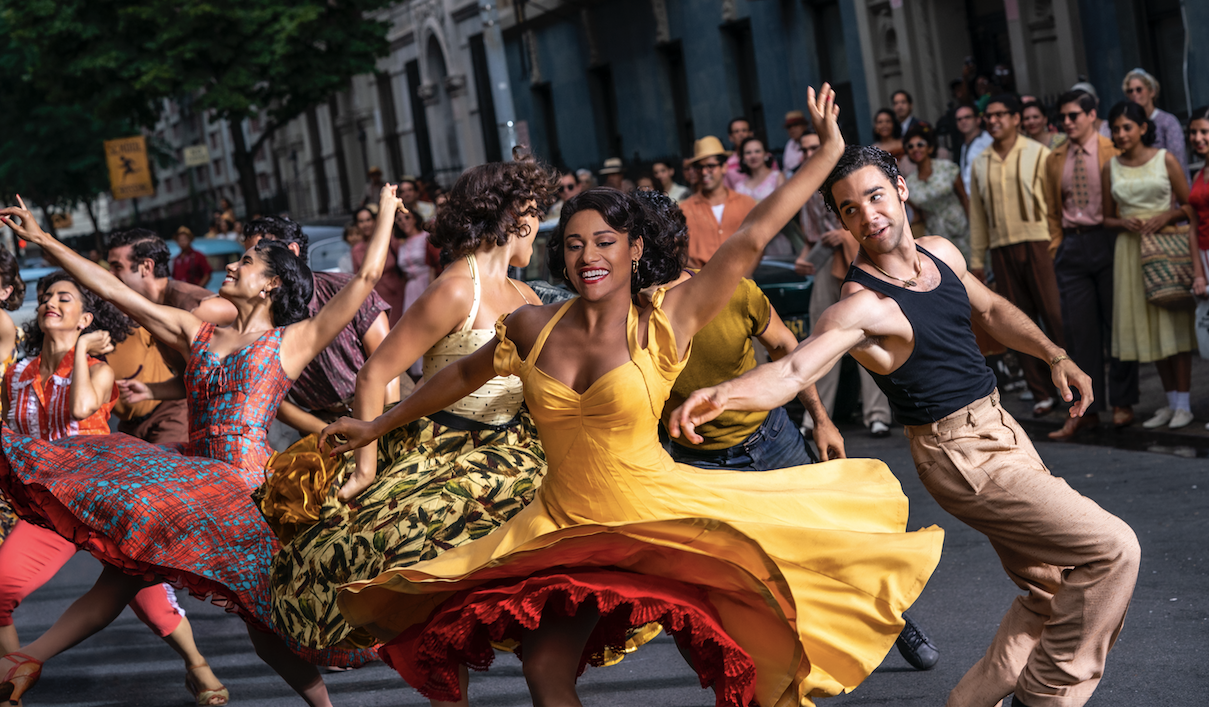
It sure is pretty, though, and "America" bears watching on repeat. Also, as I have stated multiple times previously, I love when Spanish (or any other language) isn't subtitled. Did I know what was being said? Mostly not. Is that fine? Why shouldn't it be? ALSO: Rita Moreno.
Anyway, call me when we get to the sequel, Anita and Maria on a Rampage.
, 22 March 2021, streamed via Google Play
Ah. A romantic-ish comedy about two middle-class white people in love. And nostalgic-ly twee to boot! It seems the Oscars have made me break my vow about watching movies like this. I mean, it's nice that they're never really romantically involved (kind of), but am I supposed to find Gary's never-ending persistence that he wants to date Alana charming? Especially when we're constantly reminded that Gary is 15 and Alana is 25? Dude, come on.
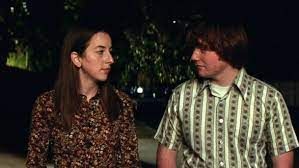
Also, there's a super-racist running "joke" and to hell with this, honestly. (Way, way, way late in the film, we get a glimpse of the relationship between her closeted boss and his secret partner--because her boss is a campaigning politician, he has Alana pretend his boyfriend is hers so they can have dinner in public. Why couldn't we have a film about that instead?)
, 22 March 2022, streamed via Hulu
Having done my Guillermo del Toro watch a few months ago, I looked forward to this quite a bit! I'll note, for the record, that I never watched the original film. But who doesn't love a noir carnival, y'know?
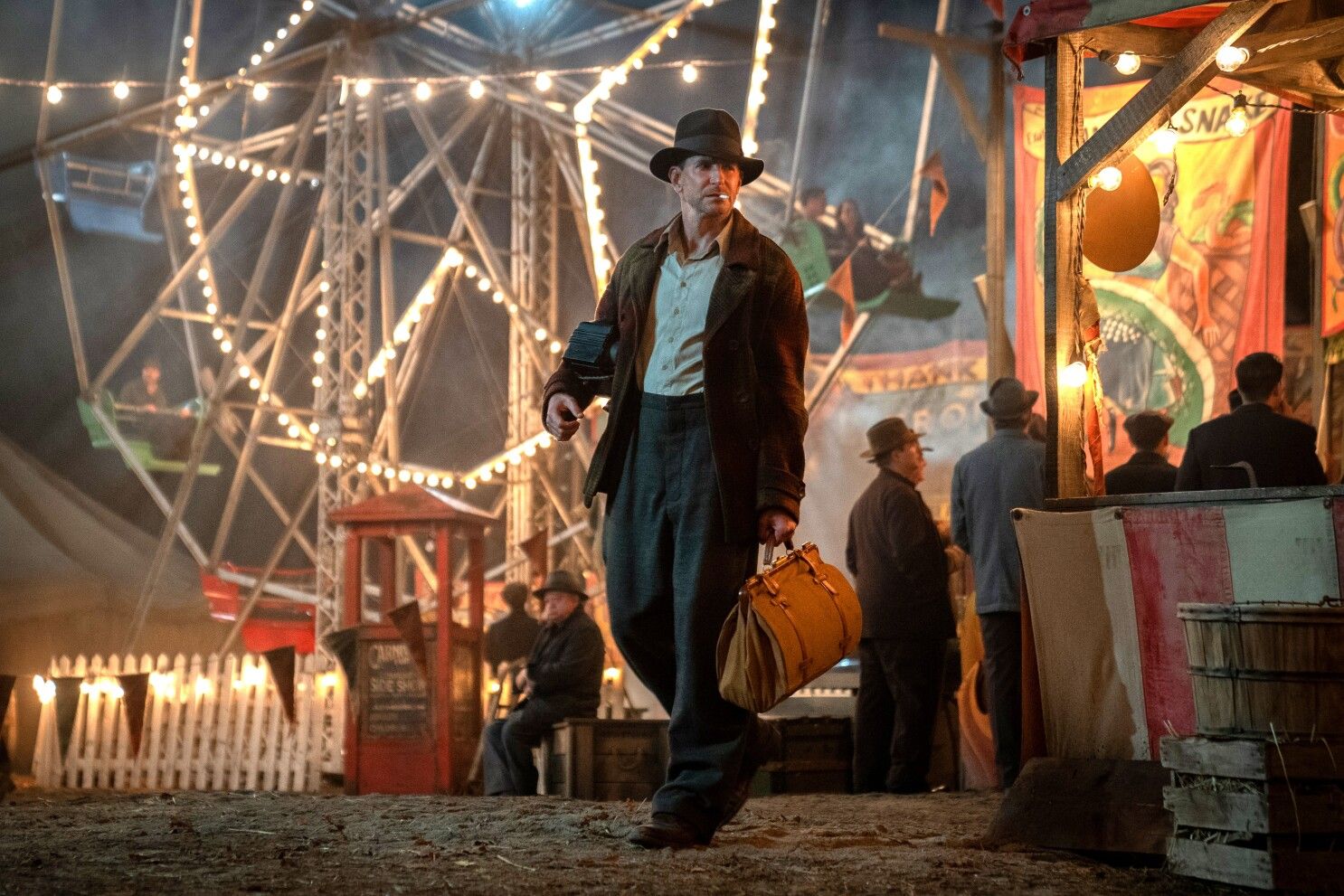
Bradley Cooper plays Stan, a hustler who falls into work at a carnival. He gets hired on and ends up apprenticing, kind of, to pseudo-psychics Zeena and Pete. He also learns from Clem, the shifty carnival owner, how to create a "geek": find a broke drunkard, give him opium, lock him in a cage and starve him until he'll eat a live chicken in front of a crowd. Charming.
It turns out Stan has a gift for hustling, though--and he's good enough that Pete warns him,"When a man believes his own lies, starts believing that he has the power, he's got shuteye, because now he believes it's all true. And people get hurt." Pete just so happens to die the next day.
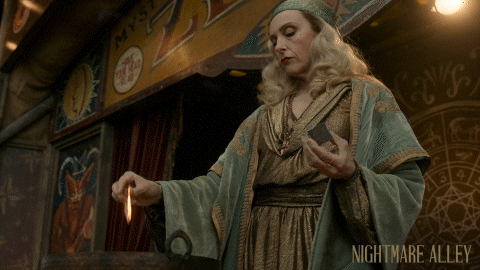
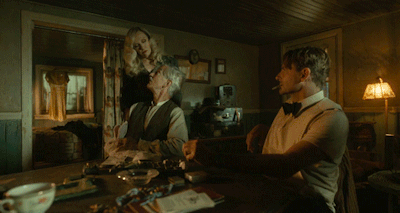
Stan convinces another of the carnival performers, Molly, to leave the carnival and take their psychic show on the road. They do pretty well--until, that is, Stan starts moving beyond the usual game and into seance stuff, which he'd been warned off before.
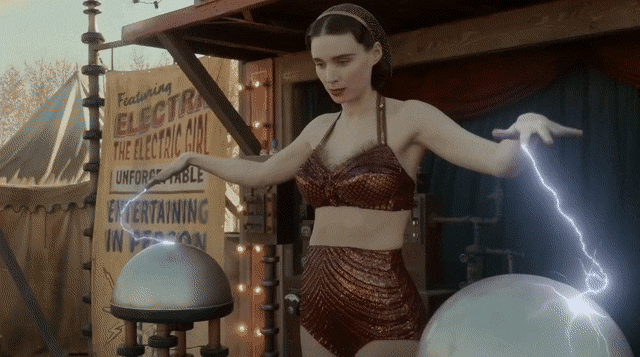
Stan meets up with a local psychiatrist, Lilith, and in a MASSIVE breach of professional ethics, she gives him some information on two of her patients in trade for, uh, nothing except a session with him? And by "session," it's legitimately a therapy session. (I mean, at first.)

Then a couple that Stan hustled kills themselves so they can meet their dead son, who Stan claimed was waiting for them. The hell, dude? Anyway, Molly leaves, Stan kills a previously hustled dude and his bodyguard, and Lilith straight-up shoots him. Stan goes on the lam and ends up signing on to a different carnival as, ouch, a geek.
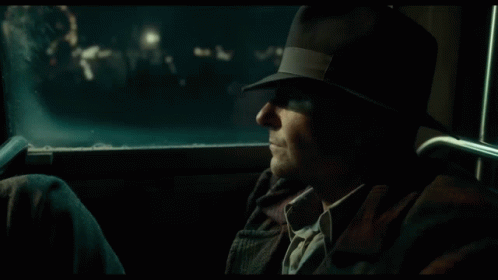


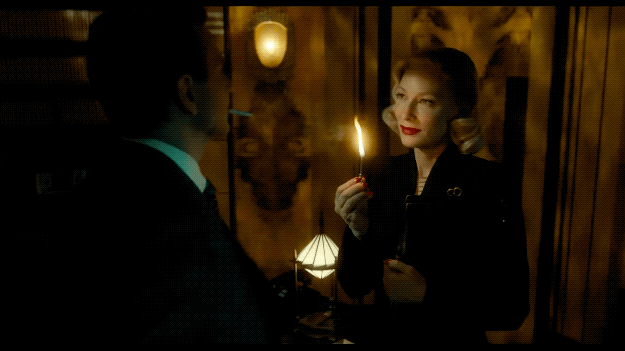
As with pretty much all del Toro pieces, this is a gorgeously shot film as well as a depressingly enclosed narrative. You leave it knowing the story is finished and wishing it hadn't ended this way.
, 22 March 2022, streamed via Netflix
So one of the running "jokes" in the first chunk of the film is Patrizia, aunt of the protag Fabietto, who is often less than clothed and fairly unstable, is also very hot and her husband keeps calling her a whore. And Fabietto and his brother talk about how hot and naked she is later, so. Uh.

But here we are in Naples in the 80s, hanging out with a jolly, prankster family, as affectionate and intensely fatphobic as apparently all families tend to be (in fiction, at least). Fabietto's parents are charming, but not without their problems. Fabietto and his brother are good buddies--when Fabietto has a panic attack, his brother embraces him and whispers to think about their favorite

The way this film is shot--and it's supposed to be a fictionalized memoir of the director, Sorrentino--you just sort of assume young Fabietto spends half his life wandering around with an extremely embarrassing erection. (Is it a coincidence that Fabietto looks like Chalamet in Call Me By Your Name? Because, seriously. These two fictional boys would 100% be buddies.) Sorrentino has some Madonna/whore issues, my guys

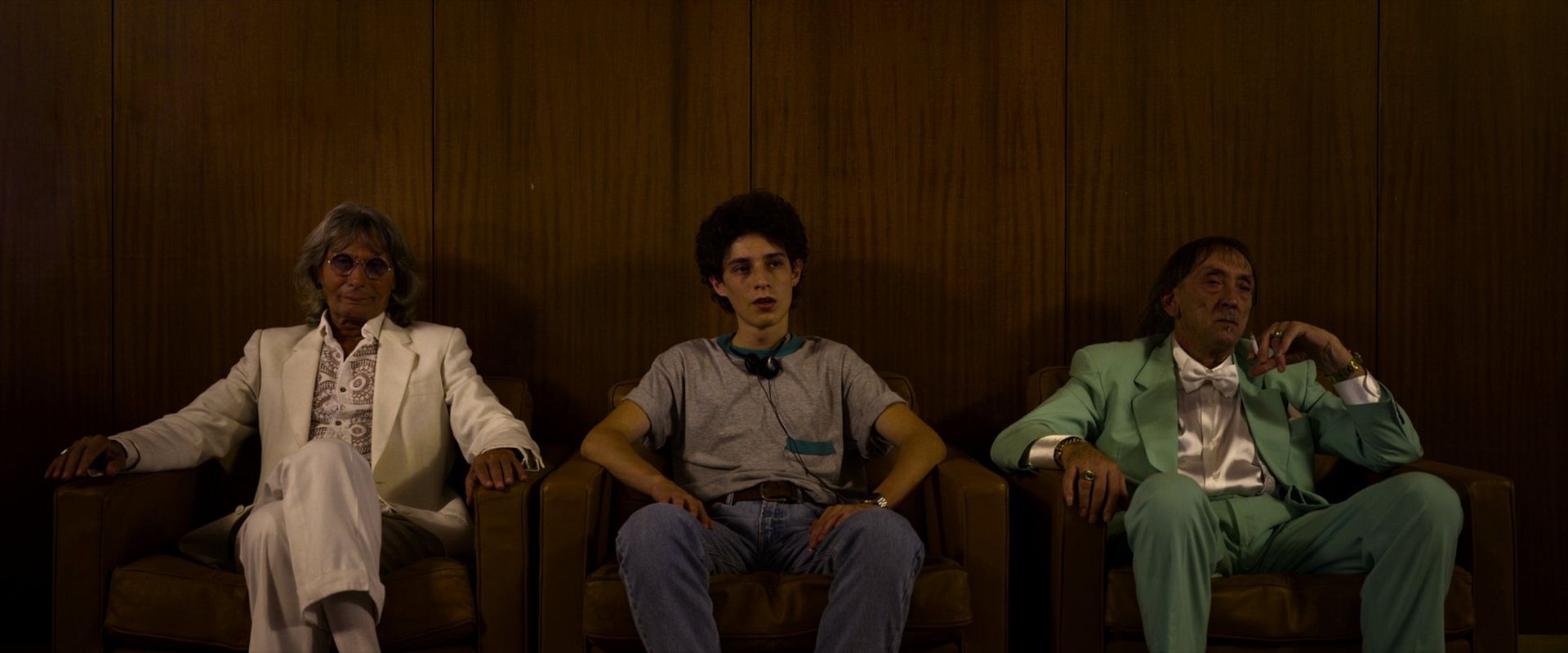
And yeah, there's a whole running thing about a

The rest of the film is much quieter, but possibly more absurd in parts. (An upstairs neighbor, a gorgeous elder woman, asks Fabietto to come rid her of a bat and ends up deflowering him? He makes friends with a cigarette smuggler and runs into Adnan Khasoggi, richest man in the world, in Capri?) Given this is Sorrentino's memoir, it makes sense that it's laced through with appearances of and references to Fellini and Capuano. Fabietto ends up where he was always heading: talking film with one of Italy's notable directors, finding life more legible through art.
The Mitchells vs. the Machines
, 23 March 2022, streamed via NetflixI did not expect this film to be as charming as it is. I did, however, find it strange that it seems to run so parallel to another recent film, Ron's Gone Wrong, in that our AI companions are perhaps more sentient than we intended. Specifically, when a tech mogul tosses aside his first AI buddy, PAL, for an upgraded version, she takes it reallllll personal.
"It's almost like stealing people's data and giving it to a hyper-intelligent AI as a part of an unregulated tech monopoly was a bad thing."
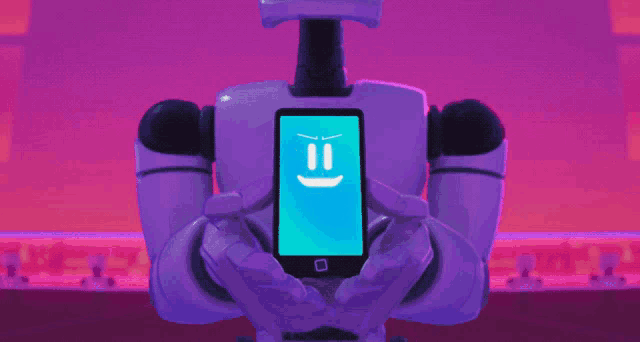
Meanwhile, our protag family is the Mitchells. Katie is our POV character--she's confirmed queer, she's YouTube famous, and she's going to film school soon. Her father Rick, however, is the Luddiest of Luddites and would like her to live her life a little safer, honestly. Mother Linda, is a cheery schoolteacher whose sunny nature is posssssibly based on Linda from Bob's Burgers. Finally, there's Aaron, the younger brother who is very into dinosaurs and likely neurodivergent in some way. Anyway, Rick wants everybody to put their screens down and live their lives authentically or something.
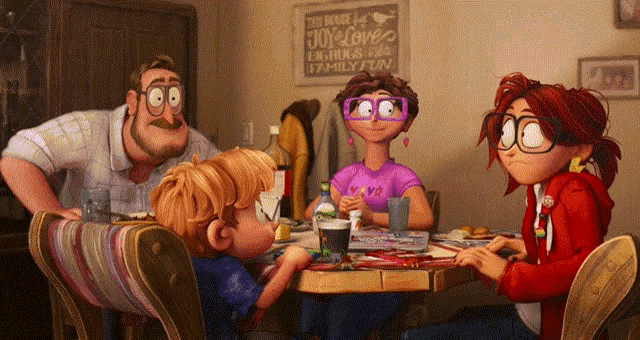
In a last bid for family togetherness, Rick decides the family should go on a road trip to take Katie to school across the country and it's great.
Unfortunately, the robot apocalypse begins. Humans are rounded up and put in little glass boxes to send to space, but SOMEHOW the Mitchells escape. It's all up to them now! And the two malfunctioning robots who want to be human.
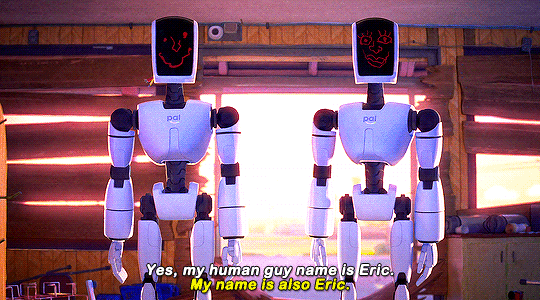
Everything with a computer chip has turned against them. (Guys, this is the exact plot of the guinea pig movie G-Force.) Some of it is hilarious--Roombas thwarted by an escalator--and some of it is terrifying. Like, Furbys.

The art in this movie is rife with multimedia and faux-filters and stylistic shifts. It should be too much, but it's just really fun instead.

Anyway, things get craaaaazy implausible and it's only highlighted when Katie starts framing everything in terms of making an extremely cool movie. But it's lovely! I might have started crying when Linda switched into Mama Bear mode!

SO FUN.
, 23 March 2022, streamed via Apple TV+
CODA stands for Child of Deaf Parents. Our protag, Ruby, is the only hearing person in her family--in addition to her parents, her older brother is also Deaf. That said, the core of this film is a pretty familiar one: A young woman struggles to establish her own identity instead of being subsumed into her family's ambitions and desires.

It's a multigenerational fishing family, so Ruby acts as an interpreter not just in what we think of as "everyday" interactions, but also in things like debating costs with a supplier and arguing about market prices. In one hilarious early scene, she has to go to the doctor with her parents because they have, heh, jock itch. She unsuccessfully tries to convince her parents they can never have sex again. (Her brother more successfully hooks up with his soon-girlfriend by texting with her, face to face.)

The external conflicts are two-pronged: There's a push for fishing regulations that would include outside monitors, which puts considerable pressure on them in terms of fiscal solvency. And at school, Ruby joins choir because she loves singing. Like, a lot. It's the one school space where she seems to feel at home--outside of it, she's constantly mocked. Plus, her eccentric choirmaster is pushing her to a more rigid practice schedule, as he thinks she could make it into the Berklee School of Music.

There's also a hilarious scene where Ruby and her choir partner, Miles, catch her parents having sex, and they turn it around to quiz Ruby about who this new dude in their house is.
Ruby wants her family to be supportive, but they--really weirdly, TBH--have no sense of why she would care about music. (Responses from the Deaf community are generally positive, in that actual Deaf actors were cast, but some of the representation isn't wholly accurate, and of course not fully representative.) It takes her brother's girlfriend's testimony for them to understand she's good. They are, perhaps understandably, more concerned about Ruby's support as their fishing community essentially attempts to unionize. (She tries to skip out of interpreting when they're interviewed by the news; when she doesn't show up for work one day, her father and brother don't catch the alarms from the approaching Coast Guard and get their licenses revoked.)
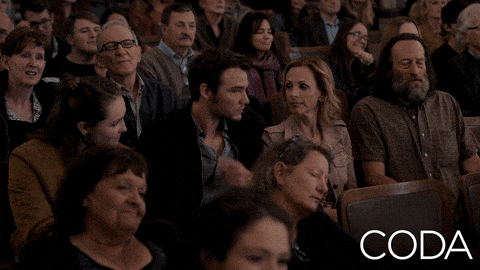
I do wonder, like, how there are no professional interpreters around ever? Like, they should have 100% had one provided at the court hearing. It's weird they didn't have one at the school concert, given there was a deaf family there--I have a friend who is an ASL interpreter for a public university, and she usually only works with one or two Deaf students every year. OH AND HEY, when that TV station interviewed them, how did they not bring an interpreter along? I know one of the points of the film was that Ruby has been made to act as their full-time interpreter, but for real, y'all.
And why didn't Ruby sign along when she was singing? I suppose it wasn't something she thought about doing during rehearsal, so she wasn't prepared then. I was SO RELIEVED when she did it during her audition, though.
Everything works out beautifully. I may have teared up. Again.
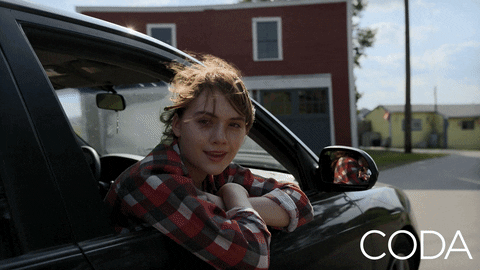
, 24 March 2022, streamed via Prime Video
In 1971, the prisoners of Attica in New York rioted and took over for five days in, essentially, a protest demanding more humane treatment. They took some hostages--prison guards--but despite the initial melee, only one died.
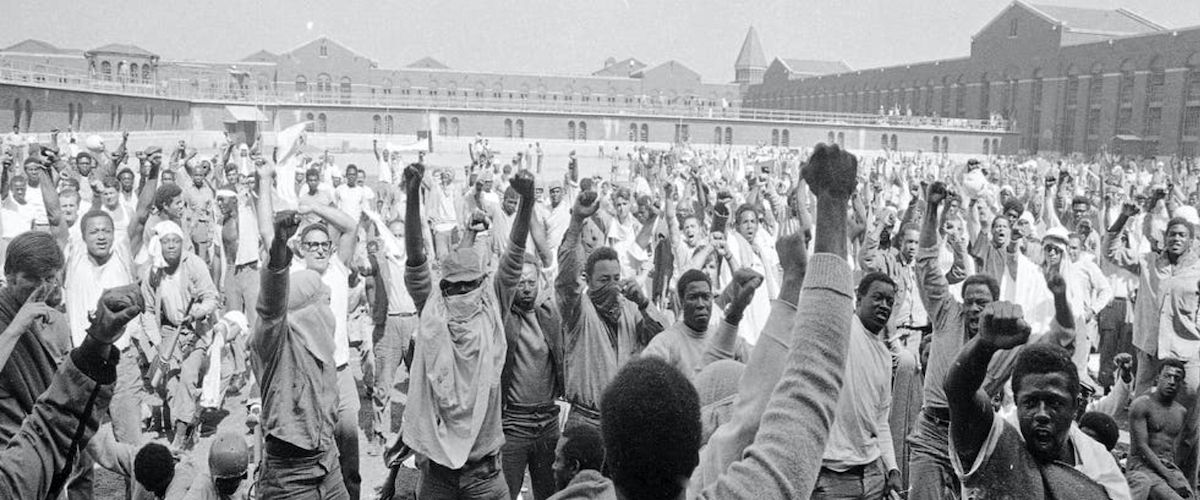
The way that news footage, interviews, and reenactments merge and overlap with each other is seamless--we have, essentially, a full narrative with a TON of details. The survivors interviewed acknowledged that some of the folks in the prison absolutely should have been in prison, but if they were subsisting on 21-cent meals and one roll of toilet paper a year, well. The media documented everything pretty well with interviews and footage. Everything, including the day when Governor Rockefeller decided to send state troops in for a lethal intervention.
As a helicopter hovered overhead, they announced, "Surrender peacefully--you will not be harmed." An echo of that statement relentlessly plays over the testimony and footage and aftermath of state troopers firing into the crowd. Twenty-nine of the protesters AND ten of the hostages were killed. (Official reports attempted to blame the prisoners for the hostages' deaths; that did not bear up under scrutiny.)
Afterwards, the folks who were outspoken with the press were tortured. There's footage of post-massacre officials shouting, White Power. There's a phone call of Rockefeller assuring President Nixon that no white people were killed.
I hate everything.
, 24 March 2022, streamed via Apple TV+
I should first confess my preferred version of The Scottish Play is actually the reenvisioning done by Gargoyles in the 90s. Like, I legit made this argument when I was taking Shakespeare as an English major.
I've always been partial to films that feel like theatre productions, and Coen's Macbeth doesn't disappoint. The sets are stark and functional; the props are almost non-existent. Where Coen makes the most use of the film format is in lighting--shadows and sunlight are material elements more striking than any other.
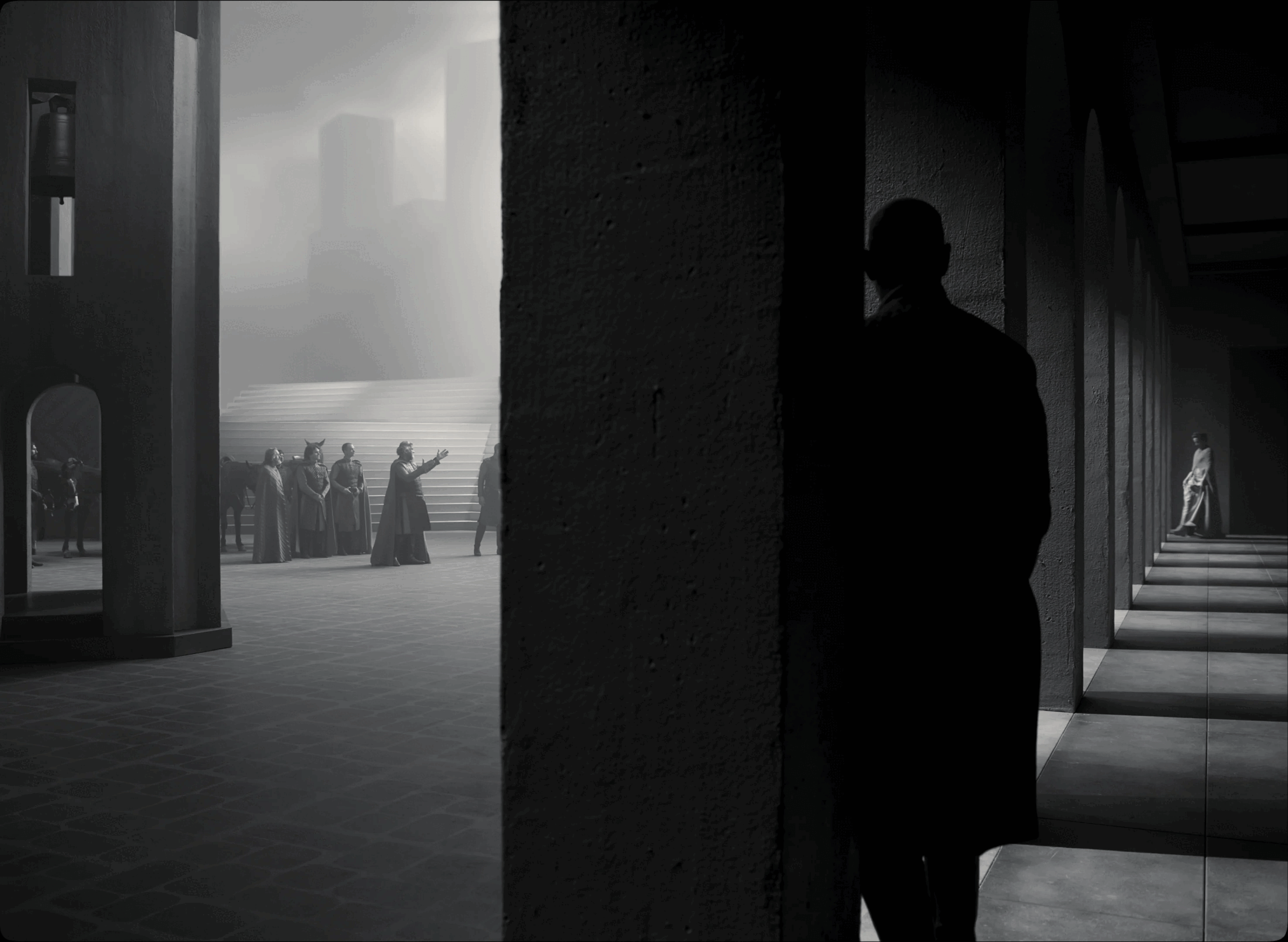
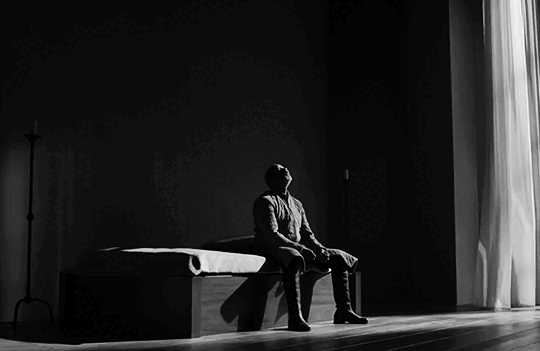

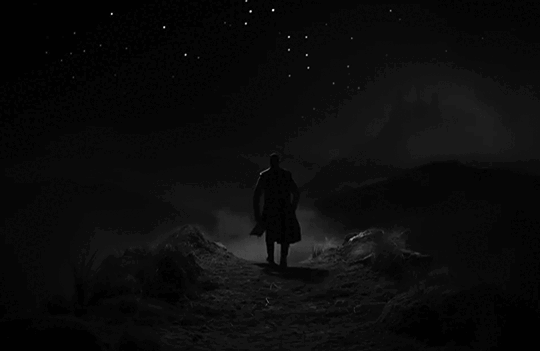
And rather than making a tableau of scenes, the characters often move towards the camera, making each statement a soliloquy in itself. And, I don't know, whatever's going on with the Weird Sisters or whatever, well. They don't need fancy tricks to become eerie.
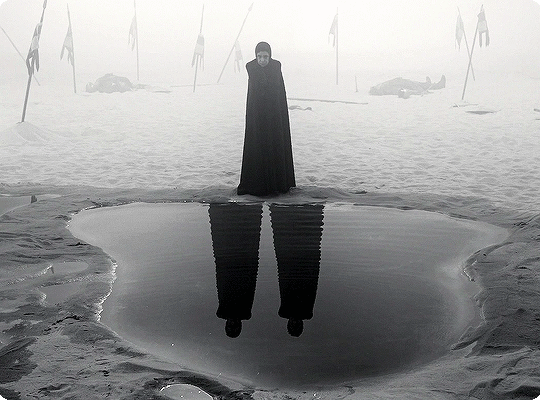

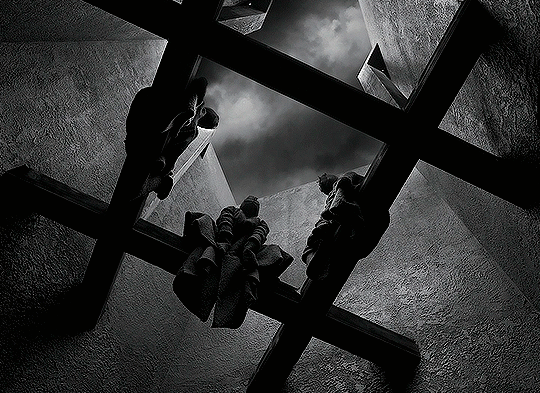
Despite the staginess of the whole thing, Coen largely keeps the camera right up on the characters. Sometimes the language of Shakespeare can obscure the meaning in modern times. Here, not so much.
, 24 March 2022, streamed via Prime Video
I have vague childhood memories of the first movie, but I cannot remember if it warrants a sequel. But here it is, I guess? And it hinges on Eddie Murphy's Prince Akeem of Zamunda, having sex while drugged, so. Uh. Yikes? The result of that questionable hookup particularly matters because the crown can only go to a MAN. Cue the surprise illegitimate son! But, like, have you seen these three glorious princesses already around?
Anyway, without stopping for a paternity test or nothin', we get Lavelle, his mother, and his uncle all up in the palace, Princess Diaries style, though they make some nods to Wakanda, too.
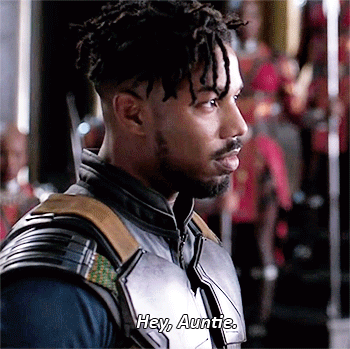
There's a stereotypical strongman lurking in the kingdom of Nexdoria (*facepalm*), the eldest princess of Zamunda feels pushed aside, and Lavelle realizes he'd rather marry for love than for statehood.
There's some cringeworthy humor, but also a few sharp observations (Lavelle experiencing every microaggression possible in a job interview early on, for example), and generally, it's just kind of bawdy.
Anyway, everything ends up happily, as expected. Also, this film got Oscar-nominated for costuming and it's not hard to see why.
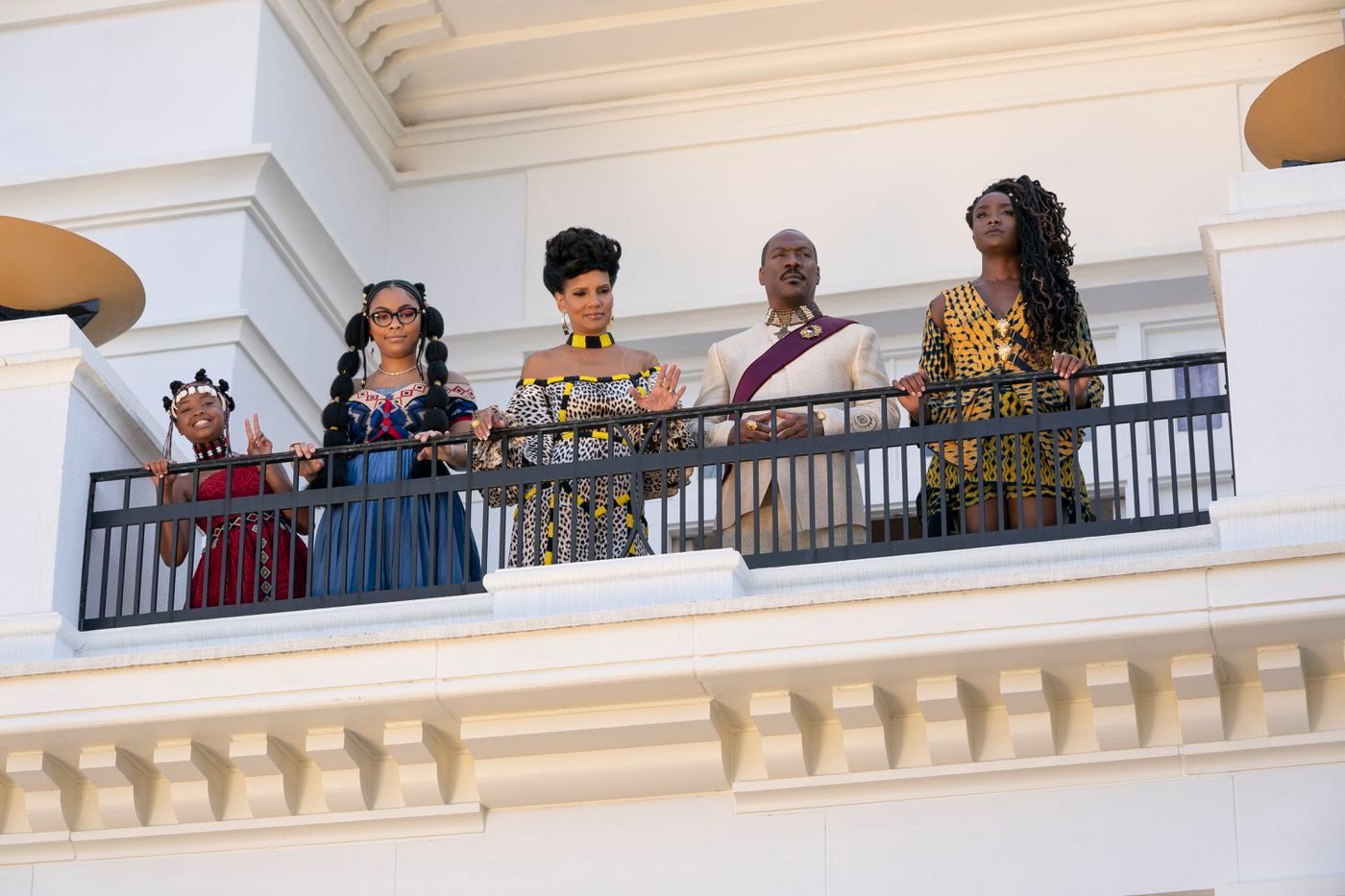
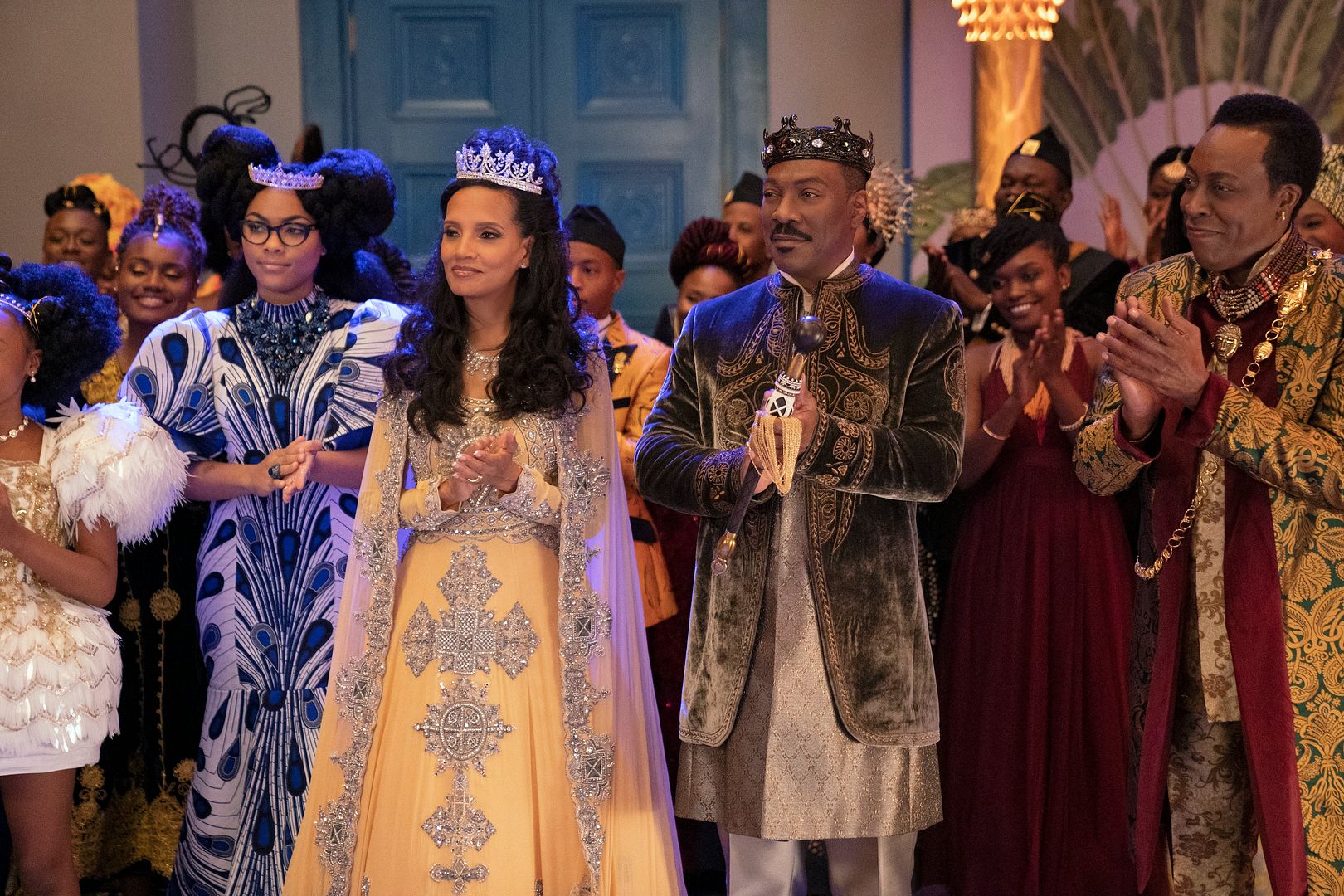


, 24 March 2022, streamed via Vudu
Janis and Ana are in the same room in the maternity ward and discover they're both single mothers. They end up exchanging numbers--their daughters are born at almost the same time.
Janis (Penelope Cruz) had an affair with a married forensic anthropologist--she had asked him and his foundation to excavate a mass grave in her home village. (That's the first bit we get, actually, after the initial scene-setting, particularly mentioning The Historical Memory Law, which helps folks whose families were victimized by Franco during the civil war.) Later in the movie, we find out Ana was gang-raped, making her maternal experience much less happy than Janis's at first.
Ana's baby dies. SIDS.

When Janis meets up with the baby's father, Arturo, he points out the baby doesn't look much like him. The baby doesn't look like anybody in Janis's family, either. Janis takes a maternity test and it turns out the baby, Cecilia, is not hers! Her baby and Ana's got switched in the hospital! WHAT.
Ana's father is out of the picture and her mother, a theatre actor, goes on tour. Lacking a support system, Ana ends up staying with Janis--as live-in childcare, which. Yikes, Janis. What is going on with you? Then Janis and Ana end up lovers? I guess? Is how we could describe their relationship? Also, Janis is almost the same age as Ana's mother, so it's yikes all around, I guess?
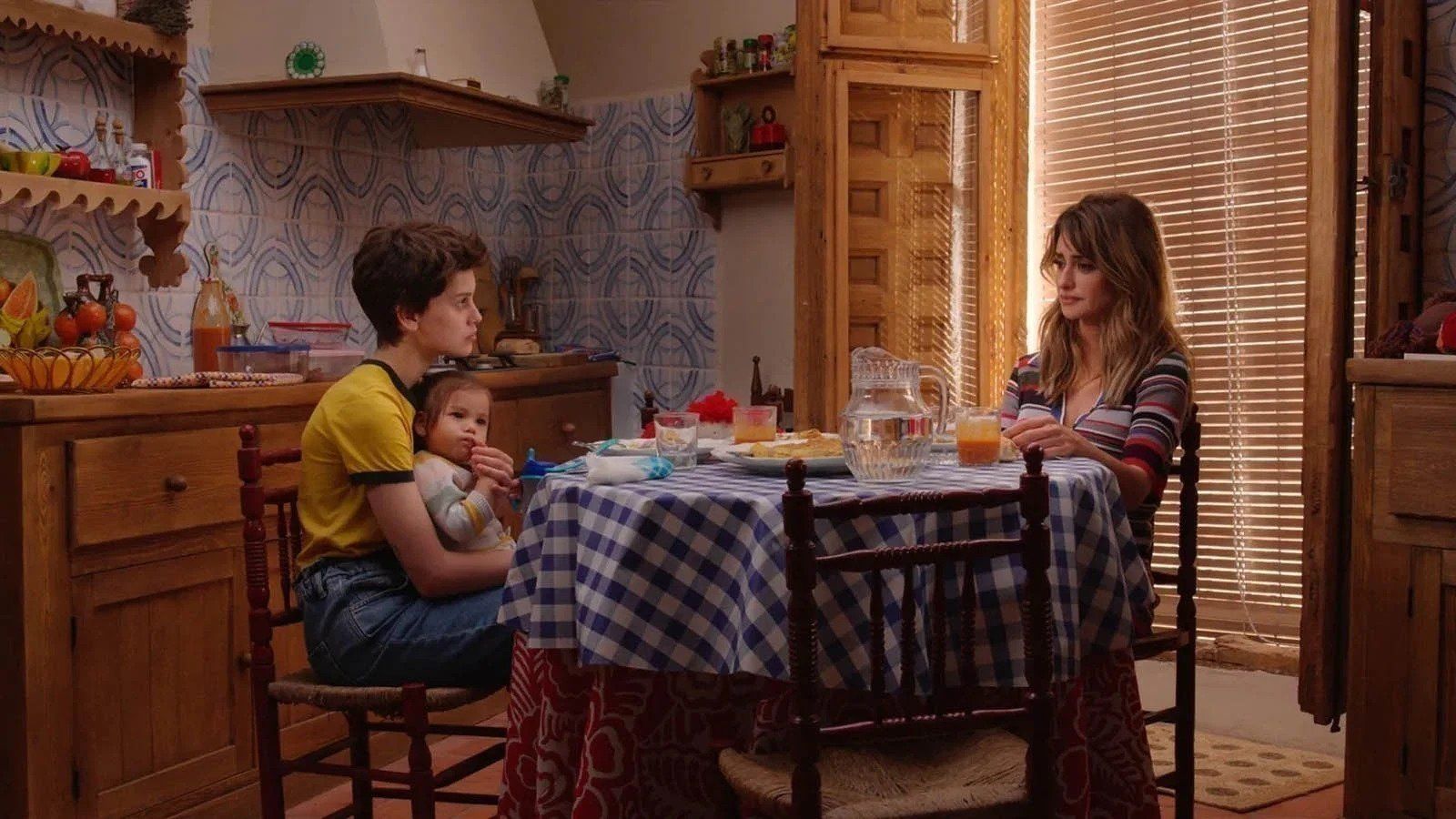
Ana takes their hookup much more seriously--Ana gets prickly when Arturo separates from his wife and returns to Janis. There's some drama and FINALLY Janis tells Ana about the baby switch. Ana does not take that well, either.

Ana takes Cecilia when she leaves. (I have a lot of paperwork questions here, but I'll let it slide.) Janis and Ana make peace quickly, though--Janis can visit baby Cecilia whenever. Meanwhile, Janis and Arturo after expecting another baby! So this is…kind of a happy ending? I don't know.
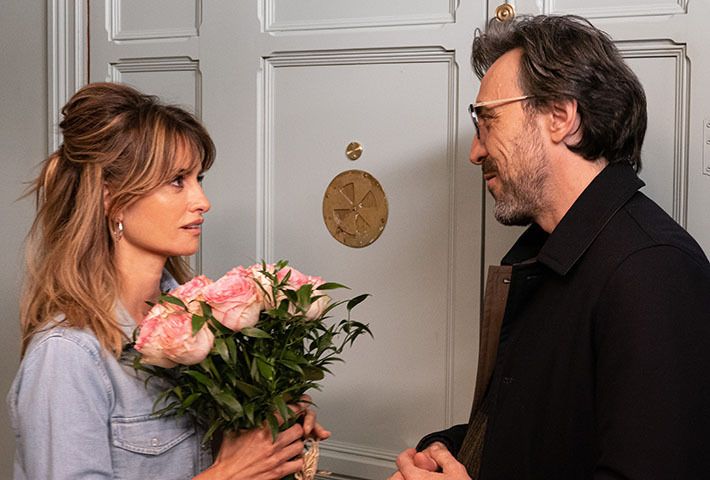
Penelope Cruz is so dang good in this movie, though. Also, extremely pretty, as per usual.
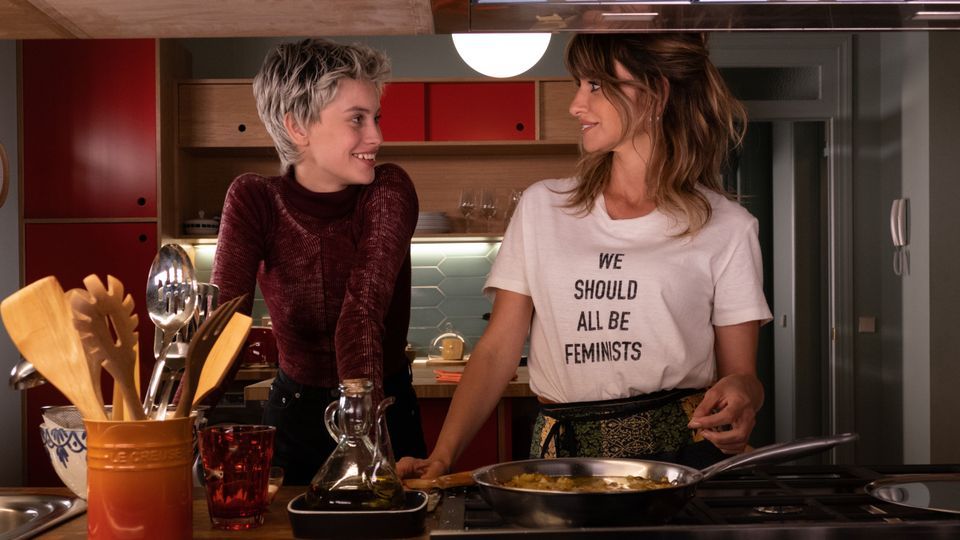
The question of the mass graves is a continuing thread in the film. It's how Janis meets Arturo. Arturo returns as the excavation gets approved. Janis and Ana get into a spat because Ana apparently knows NOTHING about the Spanish Civil War. And we travel with Janis and Arturo as they travel to interview the other village families who lost their loved ones in the war. The last chunk of the film is fully devoted to the excavation, including a close examination of the uncovered mass grave (which I assume is a facsimile).
We end with the quasi-family, along with everyone from the village, gathered at the dig site, remembering. The final shot is of the excavation team, arranged to mimic how they found the skeletons positioned in the grave.
Lunana: A Yak in the Classroom
, 24 March 2022, streamed via VuduThis is Bhutan's entry for the "Best International Feature," mostly in Dzongkha, which is Bhutan's official language. Our protag is Ugyen, who is training to be a teacher in a Teach for America type program. As he's approaching his posting, however, his coordinator scolds him for being unmotivated. (He wants to go to Australia to pursue his career in music, which…okay, buddy.) Anyway, young Ugyen is sent to the town of Yunana, which is up in the mountains. It has no electricity, Ugyen believes, and a population of 56, but no matter the locale, every child in Bhutan is guaranteed a quality education. (Legit: Bhutan doesn't pass laws except to foster the nation's Gross National Happiness Index, would that we all could, etc.)

So off Ugyen goes to the mountains--it looks like the bus ride up is a couple of days, and then a six-day walk up into the mountains. SIX DAYS. WALKING. Upon arrival, Ugyen immediately requests to be sent back because he has no gumption. Also, Ugyen looks like a total PUNK, glued to his smartphone while Singye, his welcoming dude, tries to make small talk upon his arrival. (I am not saying I would do any better, but I'm not the main character in a heartwarming fish-out-of-water comedy, am I?)
The village leader is like, Maybe you could let our people and their horses rest up a few days before we send you SIX DAYS down the mountain? The next day, Pem Zam, the most adorable child in the world wakes Ugyen up and tells him school was supposed to start half an hour ago. Ugyen starts class by asking two children to introduce themselves and then he sends everybody home for the day, WTF, Ugyen, have you no pride?!

So way up in the mountains, they burn dried yak dung instead of the usual suspects like coal or wood. Most of the folks up there are yak herders, after all. That's also what the titular yak is about--they show their esteem for the new teacher by giving him an actual yak. (This is after Ugyen, bless 'im, actually climbs up a mountainside to harvest fresh yak dung from amongst the herd.)
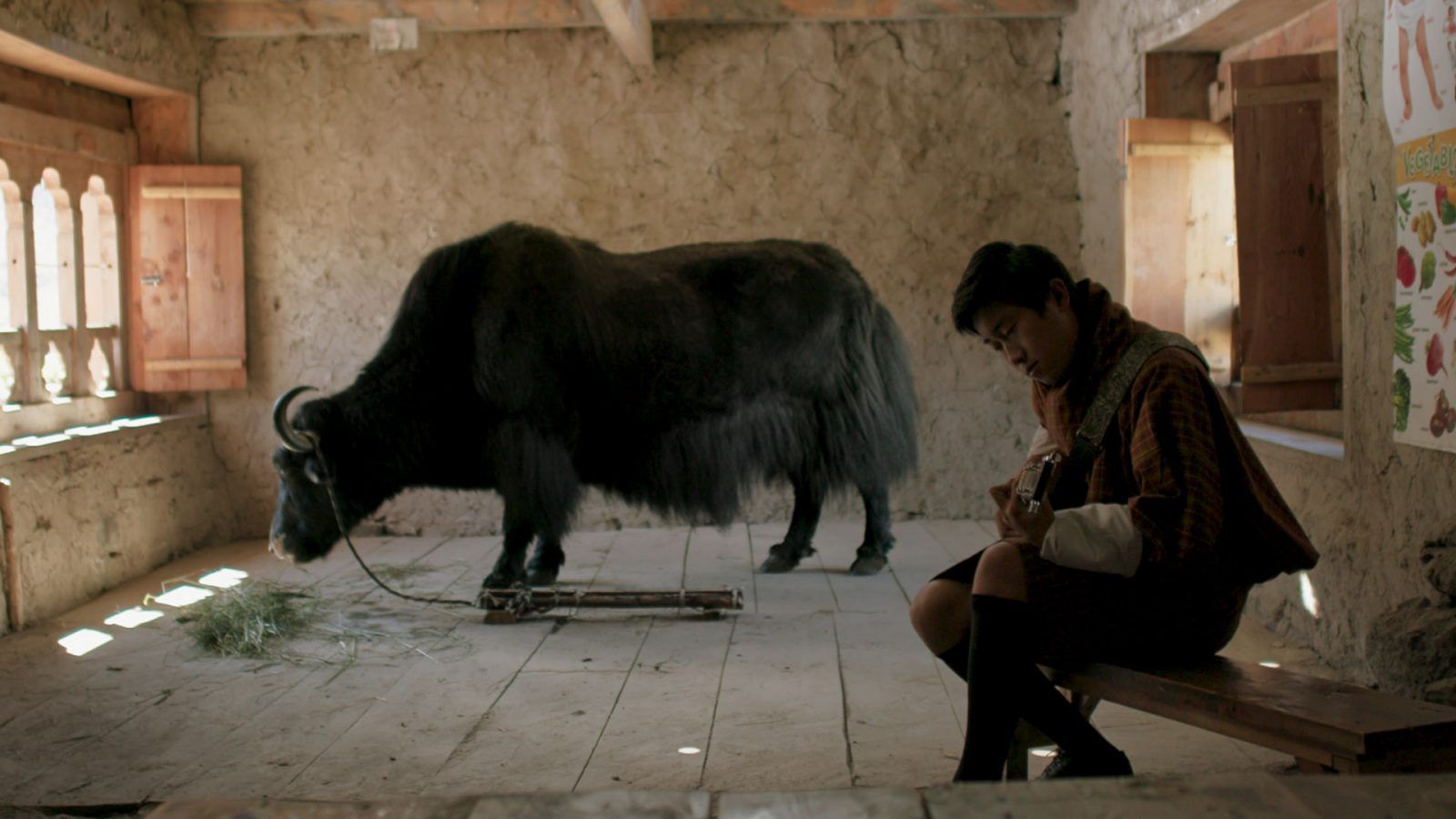
Then Ugyen meets a pretty girl about his age with a gorgeous voice. Her name is Saldon. (She suggests he maybe gather dried yak dung for his fire.) She teaches him the village song, "Yak Lebi Lhadar."
It turns out, between Pem Zam, Saldon, and just, like, getting to know the folks around there, Ugyen finds his heart moved or whatever. When he's informed Singye and company are ready to go back down the mountain, Ugyen smiles and says he'd hate to let the kids down. Awwwwww.
And then Singye makes a blackboard and chalk from scratch, like, dude.
When winter comes--particularly, when it looks like snow is going to cover the mountain passes soon--Ugyen is surprised that it's already time for him to leave. And he has a visa to go to Australia now.
OH MY HEART.
, 24 March 2022, streamed via Hulu
It's hard to say something new about the narrative of a drug addict trying to go clean. What this film has, however, are Glenn Close and Mila Kunis acting the hell out of their roles. Close plays Deb, the mother, and Kunis is Molly, the youngest daughter.
This is Molly's fifteenth attempt at going sober and if she can stay clean for a few more days, she'll qualify for an opioid-blocking shot. Reluctantly, Deb lets Molly return home for those days, because the shot sounds like her last chance, and theirs.
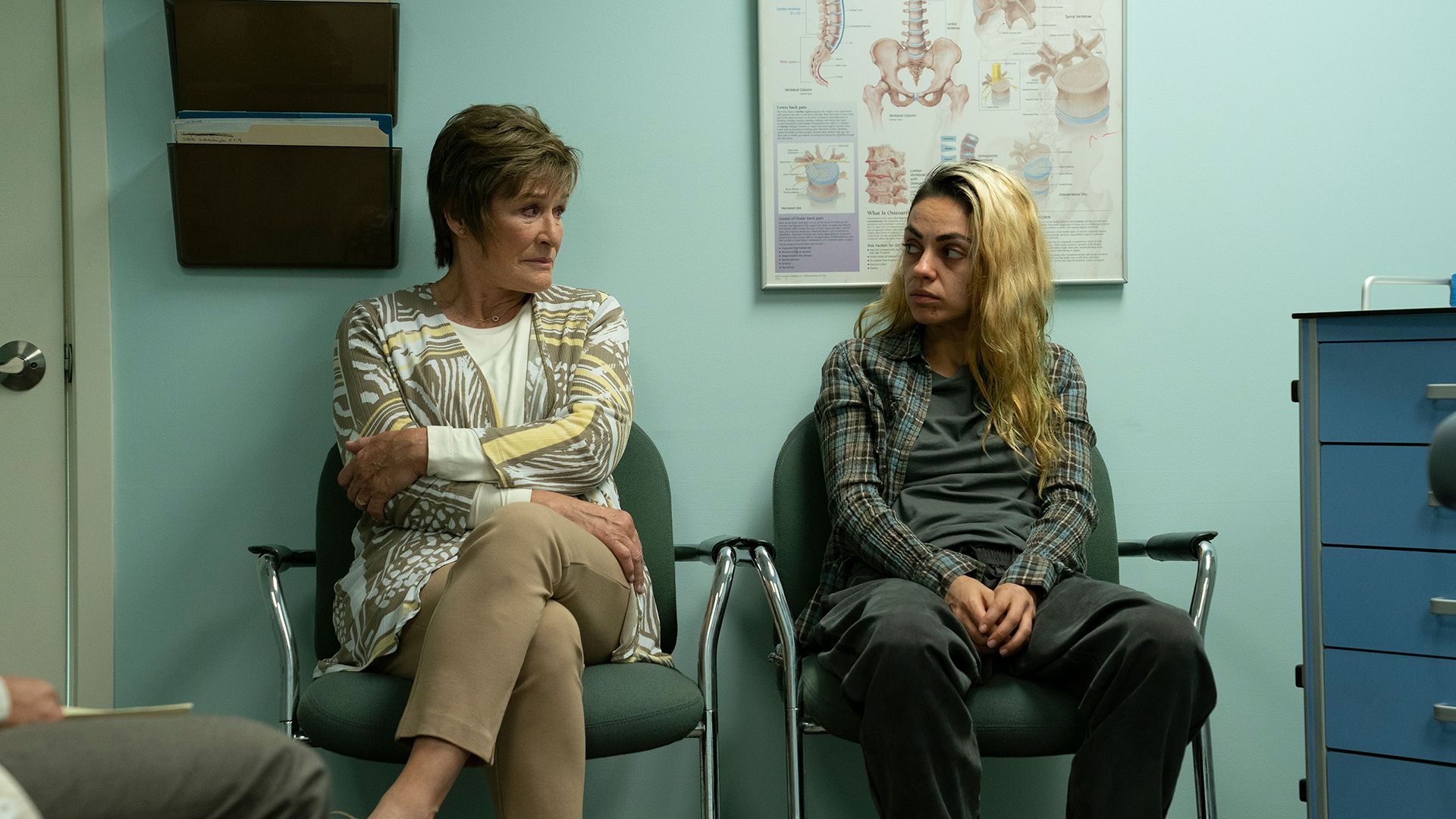
What's fascinating about this film is how completely awful Deb is to everyone around her as she desperately tries to monitor her daughter. She viciously snaps at her husband (she married after she divorced Molly's father) every time he suggests that she's taking too much of a burden on herself. She's having lunch with her oldest daughter and just up and walks out, mid-conversation, because she's freaking out about Molly. She cusses out pretty much anybody who she thinks is obstructing Molly's recovery. And she's intensely paranoid about Molly, which for most of the movie feels out of proportion and needlessly intrusive.
But. Well.
, 25 March 2022, streamed via Prime Video
This documentary follows the only newspaper in the country led by women--and Dalit women (the caste labeled "untouchable"), at that. We start with one of the journalists interviewing a woman who was gang-raped multiple times in one month. It is, horrifically, a common problem in India.
If you're familiar at all with the traditional journalism narrative--think Spotlight and The Post, this won't be a shocker or anything. As the Post proclaims every day, Democracy dies in darkness. Add in the economic struggles that pretty much all traditional journalism is going through, then multiply it by reporters and editors who are doubly and triply marginalized. (Later, we're told that forty journalists in India have been killed since 2014, which. Oof.) Watching these women do this work is fascinating.
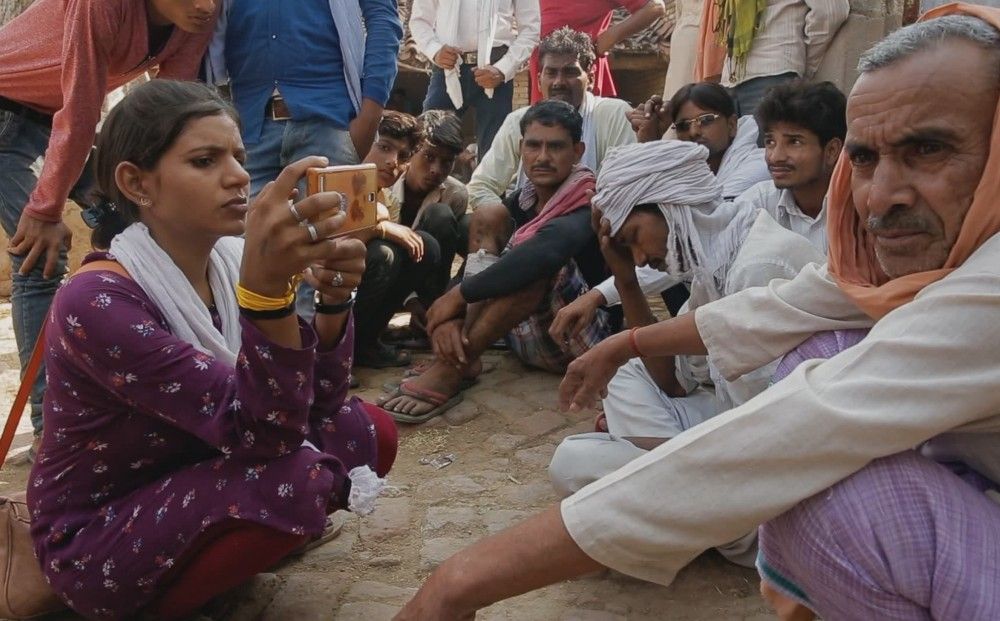
At one point, one of the reporters snaps back at one miner hassling her as she gets the scoop on their working conditions, "Instead of patronizing me, let me interview you." They can tell her all they want, but she knows she needs it on camera. Their news goes out via YouTube: Khabar Lahariya.
, 25 March 2022, streamed via Vudu
I watched this film sandwiched between Bridgerton episodes and it made quite a lot of sense, actually. Marriage, y'know? "Children need love," Roxanne's companion reminds her as they discuss a prospective husband. "Adults need money."

I somehow didn't know this was a musical, kids! Imagine how wide my eyes got when Roxanne started crooning out a window. (The songs were written by The National, dang.) We next find ourselves at the theatre, where Cyrano swings into the middle of a production to heckle the star in couplets.
What if Tyrion wasn't burdened with being a Lannister but still had all the education and sass? Peter Dinklage has carved out a pretty specific niche for himself, but he's so good that I'll never complain. Anyway, he's in love with his childhood friend Roxanne, so you can imagine how he feels when she confesses to him she's fallen in love with the new guy in town. And she wants Cyrano to be their intermediary, good GOD, woman.
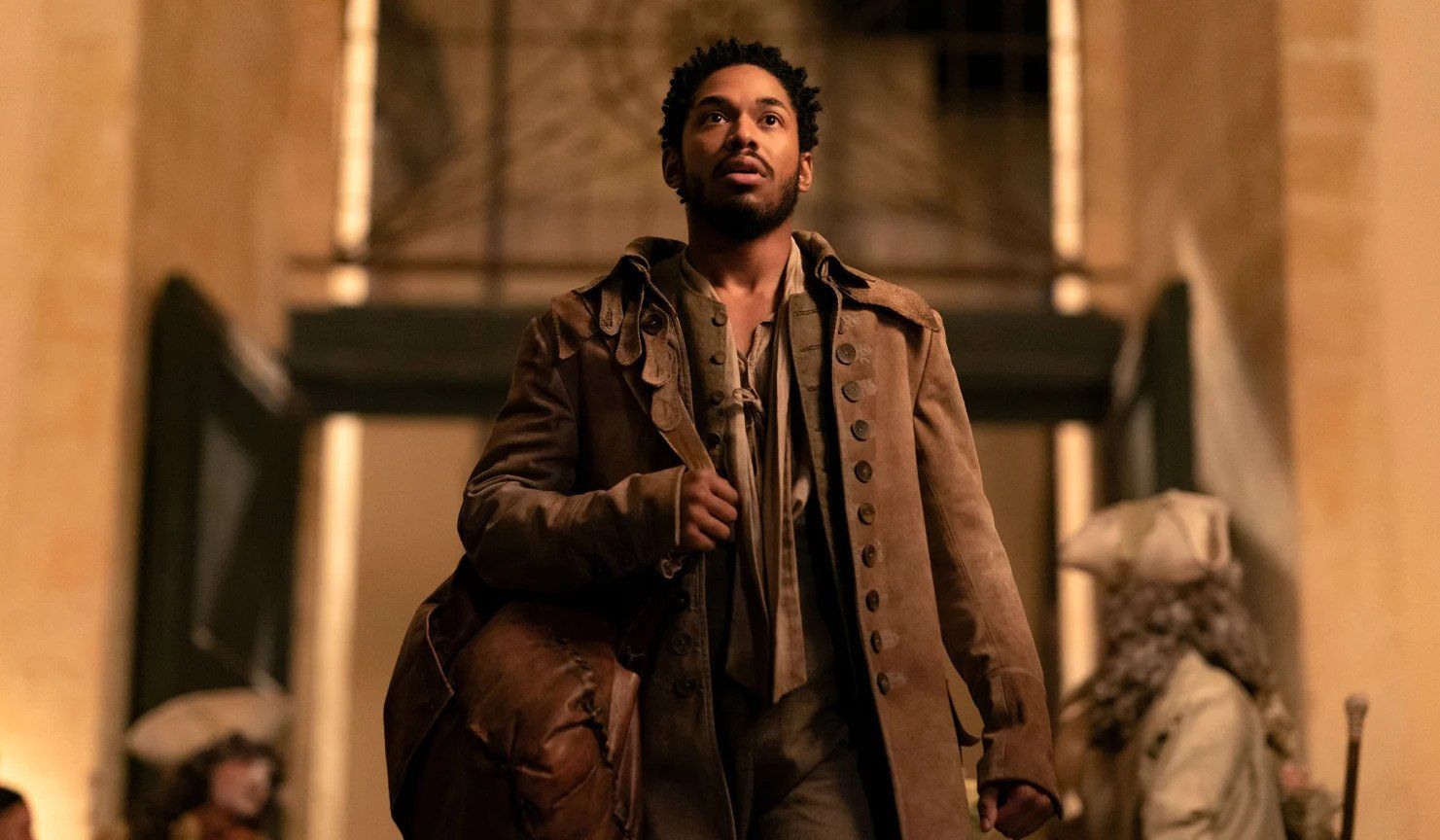
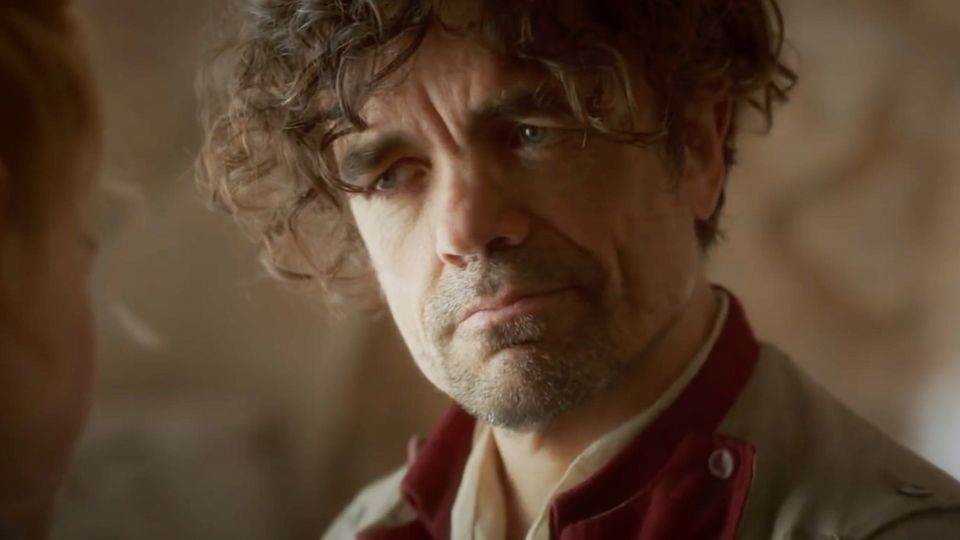
Christian is, it turns out, a total himbo. He asks, "What's the word for when you're bad at expressing yourself?"
"Inarticulate," Cyrano sighs. Later he claims, "I always have a letter in my pocket written to an imaginary woman. It's the romantic custom here."
My dude, you're lucky your new bro is a himbo.

I should note at this point that every time somebody says "Roxanne," I immediately hear Ewan McGregor singing in Moulin Rouge.
Anyway, Roxanne falls in love with this Cyrano-Christian hybrid, and dear lord, poor Cyrano has to listen to her gush about how Christian seems to know everything about her and all of her desires. *facepalm*
"Would you love him if he wasn't handsome?" Cyrano asks.
Roxanne is blindly smitten. "I cannot imagine it."
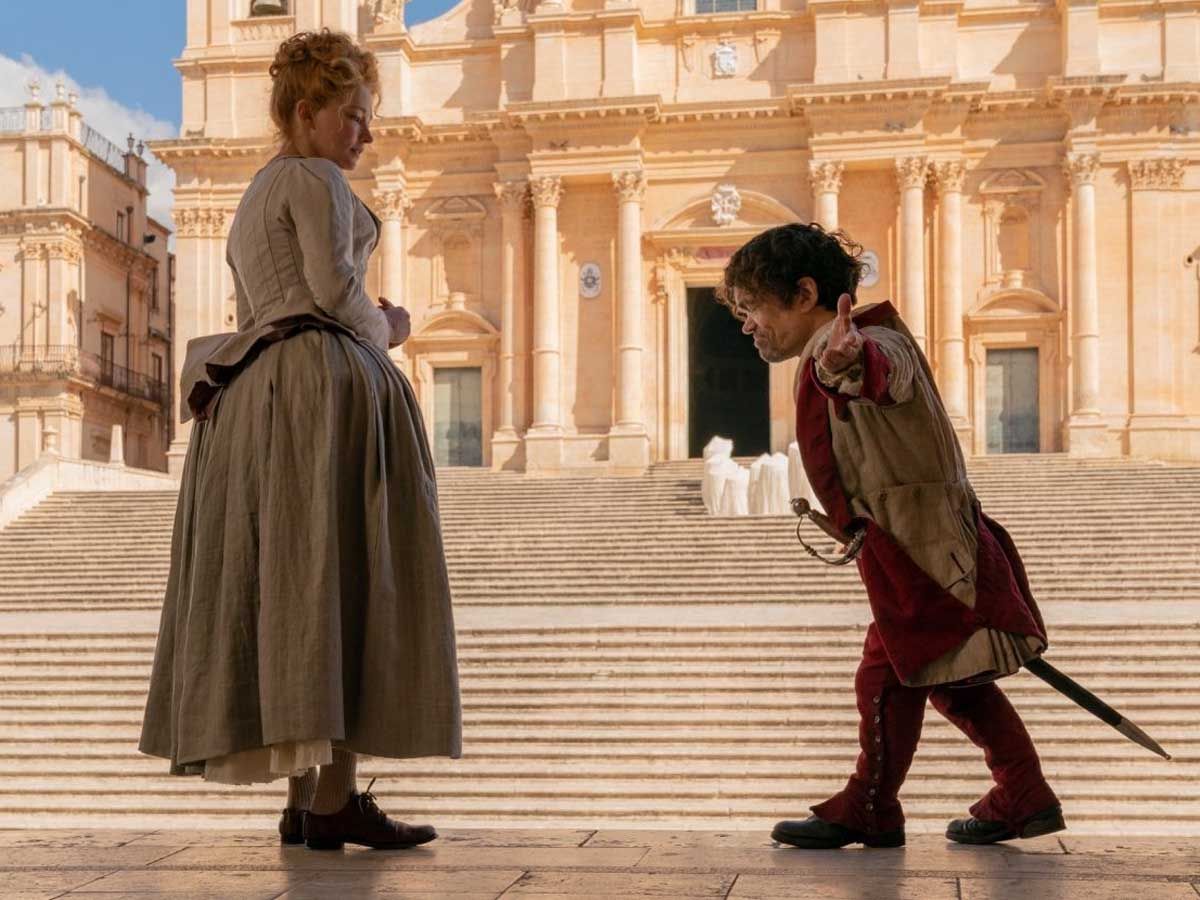
Villainous De Guiche is trying to entrap Roxanne and she, adorably, tries to convince him to not take Cyrano's and Christian's guard to the war front because she totally, absolutely, seriously does not like those dudes and he'd be doing a loving favor, honestly, if he denied them the glory of the battlefield, for real. Unfortunately, he takes it as encouragement for his courtship. Girl, the Game of Houses is not for you.

Interestingly, when Christian tries to fly solo and woo Roxanne by saying "I love you" a dozen times, comparing her to a flower, and then asking if he can smell her, it does not go very well. Yeah, she doesn't care so much about his beauty, methinks.
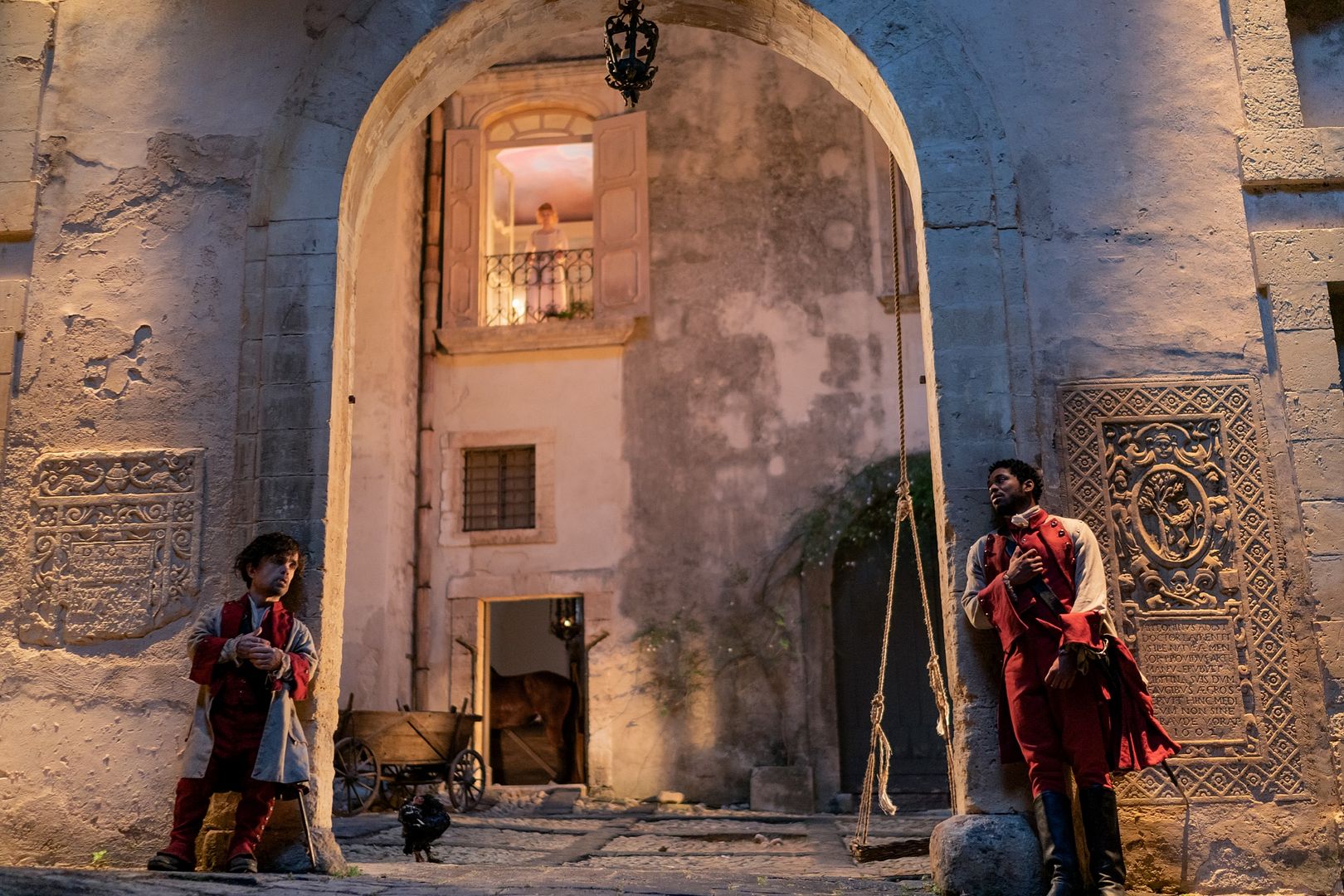
How did I not know how sad the ending was? How was this not floating around in the cultural ether? ARGH.
This year's Oscar nominees are, altogether, exquisite.
Now I've managed to watch everything except the short films (animated, live action, and documentary)--some are always readily available, but not all of them. This year Shorts.TV has been delayed in offering them; I'll take a look at those separately when they're finally out in batch.
Until then!
No comments:
Post a Comment